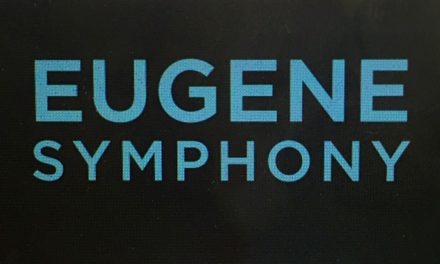By Daniel Buckwalter
(#CommonManAtTheSymphony)
It was old-school night Jan. 19 at the Hult Center’s Silva Concert Hall, and it was a treasured evening of classical music.
In front of an appreciative audience, the Eugene Symphony orchestra took the familiar and glorious roads that were traveled by Joseph Hayden and Wolfgang Amadeus Mozart as well as a dear friend of Mozart’s, Marianna Martines.
Led masterfully by guest conductor Nicholas McGegan and with a virtuoso performance by guest violinist Julian Rhee, the result was often breathtaking, and the audience was not shy about showing its support with standing ovations.
Martines’ Sinfonia led off the night. She was a friend and colleague of Mozart’s, and more of her compositions need to be performed. She was an accomplished composer of varied works. I first heard of her in 2022 when Eugene Vocal Arts performed a choral piece of hers, and her works are worth listening to again and again.
Rhee followed with a display of violin brilliance in Mozart’s three-movement Violin Concerto No. 5 (Turkish). That was something to behold, especially when you consider he’s only 19 years old.
He started each of the first two movements bent over and facing the orchestra, as if he was unafraid to get down and dirty with the musicians. Other soloists may do that, but it was the first time I had seen it. From there, Rhee’s eloquence, combined with the charming and at times bouncy nature of the concerto, made for a wonderful listening experience.
After intermission came the overture to Haydn’s opera, L’isola disabitata (The Desert Island), and the signature piece of the night for the orchestra, Mozart’s Symphony No. 41 (Jupiter).
I was struck by “been-around-the-block” conducting style of McGegan, an expert on classical and baroque music who is in his sixth decade on the podium.
It’s not demonstrative. Rather, his conducting style has the feel of a casual conversation between him and the musicians. He will simply point to a musician or a section when it’s time to enter. It was a pleasure to watch, and the orchestra seemed very responsive to it.

Daniel Buckwalter
On a entirely personal note, my older brother, Michael, died in Chicago on Jan. 8 after dealing with cancer for nearly a decade.
He played the French horn, and after studying at the San Francisco Conservatory of Music, Michael moved to Chicago with his first wife. Upon marrying his second wife, a heck of a cellist and a remarkable lady, the two embarked on a journey that lasted almost 36 years, playing in ensembles large and small throughout the country and sometimes overseas. I give my sister-in-law all the love.
I bring this up because in Mozart’s Turkish concerto, there’s an enchanting moment near the end where the French horn accompanies the string instruments to the finish. It is melodic, graceful.
And it hit home hard.
Thank God intermission was right after that piece. I had to walk out of the concert hall and through the double doors of the Hult Center so as to let the biting cold night air slap me back to reality. I then walked up and down the lobby stairs to get my thoughts together.
Music has a tremendous role to play in healing while in times of grief. I’m fortunate that Eugene has plenty of talented soloists, chamber ensembles, chorales and orchestral groups that will help me in the year ahead with that process.
I thank the Eugene Symphony orchestra for getting it started.












